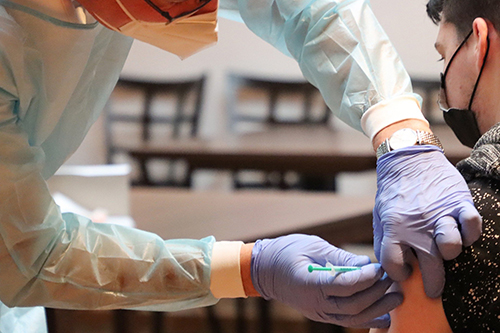Belief in Covid conspiracies linked with vaccine hesitancy, study finds

Low likelihood of accepting a coronavirus vaccine is associated with having “conspiracy suspicions” about the pandemic, a new study led by by the University of Bristol and King’s College London has found.
Fifteen per cent of the UK public believe that reporters, scientists, and government officials are involved in a conspiracy to cover up important information about coronavirus” – but this almost triples, to 42 per cent, among those who say they’re unlikely to or definitely won’t get vaccinated against the virus.
The study finds that this dynamic holds for belief in a number of conspiracy-related statements, and that people from BAME groups are also particularly likely to report believing such claims.
Relying on social media for a lot of your information about the pandemic appears to play a role, too, as well as being linked to greater levels of potential concern about getting vaccinated.
The findings are based on a survey of 4,860 UK adults aged 18-75 between 21 November and 22 December 2020.
Conspiracy suspicions and theories
Notable minorities of Britons have so-called “conspiracy suspicions” about the Covid-19 crisis, and these are especially widespread among those who are vaccine-hesitant. For example:
- 27 per cent of the public believe “the real truth about coronavirus is being kept from the public”, which rises to 64 per cent among people who say they’re unlikely to or definitely won’t get vaccinated against the virus.
- 21 per cent believe “an impartial, independent investigation of coronavirus would show once and for all that we’ve been lied to on a massive scale” – compared with 51 per cent of the vaccine-hesitant who say the same.
Belief in more concrete conspiracy theories about the pandemic is also relatively common:
- One in five people in the UK believe “the authorities want us to think that coronavirus is much more dangerous than it really is” (20 per cent) and that “the government is deliberately allowing vulnerable people to die” (19 per cent).
How beliefs and attitudes vary by ethnicity
Twenty-seven per cent of ethnic minorities say they suspect that “reporters, scientists, and government officials are involved in a conspiracy to cover up important information about coronavirus” – almost twice as high as the 14 per cent of people from white ethnic groups who say they suspect the same.
People from BAME groups (25 per cent) are also twice as likely as white people (13 per cent) to report believing “the only reason a coronavirus vaccine is being developed is to make money for pharmaceutical companies”.
These kinds of beliefs may be contributing to uncertainty about getting a coronavirus vaccine among some BAME people:
- 41 per cent of white people say potential concerns about how quickly a vaccine was developed would likely persuade them not to take it, compared with 58 per cent of people from other ethnic groups.
- 41 per cent of people from BAME groups say concerns about not wanting to overload their immune system would probably convince them not to get vaccinated – almost twice as high as the 22 per cent of white people who feel the same.
These concerns are reflected in the finding that people from ethnic minorities (15 per cent) are half as likely as those from white ethnic groups (31 per cent) to say they would like to be vaccinated immediately.
The link with where people get their information from
Those whose knowledge about coronavirus comes primarily from certain online sources, including social media platforms, are significantly more likely to have conspiracy suspicions about the pandemic and think various conspiracy theories are true.
While 15 per cent of the public overall think “reporters, scientists, and government officials are involved in a conspiracy to cover up important information about coronavirus”, this view is held by much larger proportions of those who get a great deal or fair amount of their information on the pandemic from the search engine DuckDuckGo (50 per cent), Instagram (43 per cent), WhatsApp (40 per cent), YouTube (37 per cent), Bing (34 per cent), Facebook (31 per cent) and Twitter (29 per cent).
Relying on such sources is also associated with far greater levels of potential concern about getting vaccinated.
For example, those who get a lot of their information from DuckDuckGo (63 per cent), WhatsApp (55 per cent), Instagram (54 per cent) and YouTube (49 per cent) are more than twice as likely as both the population overall (24 per cent) and those who rely on traditional media sources (24 per cent) to say they would probably be put off getting a coronavirus vaccine if there were concerns that it might overload their immune system.
Dr Siobhan McAndrew, Senior Lecturer in Quantitative Social Science at the University of Bristol, said: “Willingness to report agreement with conspiracy suspicions and beliefs is related to low trust in traditional authority sources – to the point that it constitutes a threat to public health. This is a real challenge for the campaign to ensure the highest possible Covid-19 vaccination rates. A high proportion of the public have been exposed to content that undermines trust in coronavirus vaccines and public health measures, often content intentionally tailored to the fears and concerns of vulnerable groups. Such narratives undermining trust are widely and rapidly disseminated online. This is of urgent importance for public health communicators and social media companies alike, to ensure that positive, accurate and relevant messaging reaches the groups who need it most.”
Dr Daniel Allington,Senior Lecturer in Social and Cultural Artificial Intelligence at King’s College London, added: “Social media platforms such as Facebook, YouTube, and Instagram have begun to take action on viral misinformation, but our findings suggest that they still haven’t done enough to solve this very real problem.”
Professor Bobby Duffy, Director of the Policy Institute at King’s College London, explained: “While some beliefs might seem outlandish, conspiracy suspicions are far from harmless speculation – especially in the midst of a deadly pandemic. Our findings show that although conspiracy thinking is limited to a minority of the population – something which is important to emphasise – levels of belief are particularly high among certain groups, such as the vaccine-hesitant. Addressing this mix of underlying beliefs, misleading information and harmful behaviour is a key public health challenge.”
Report
‘Coronavirus conspiracies and views of vaccination‘ by Daniel Allington, Siobhan McAndrew, Bobby Duffy and Vivienne Moxhall-Hal
*** This article has been archived for your research. The original version from Mirage News can be found here ***


